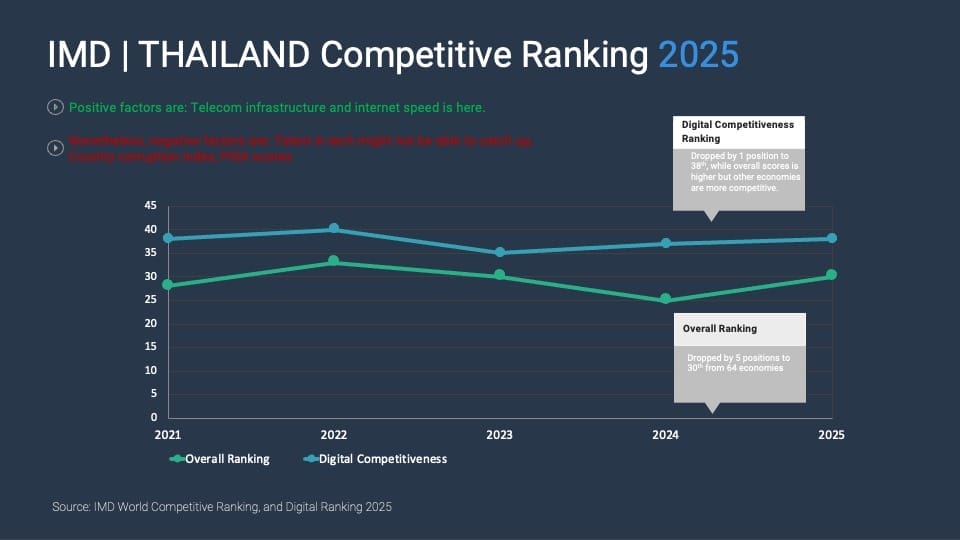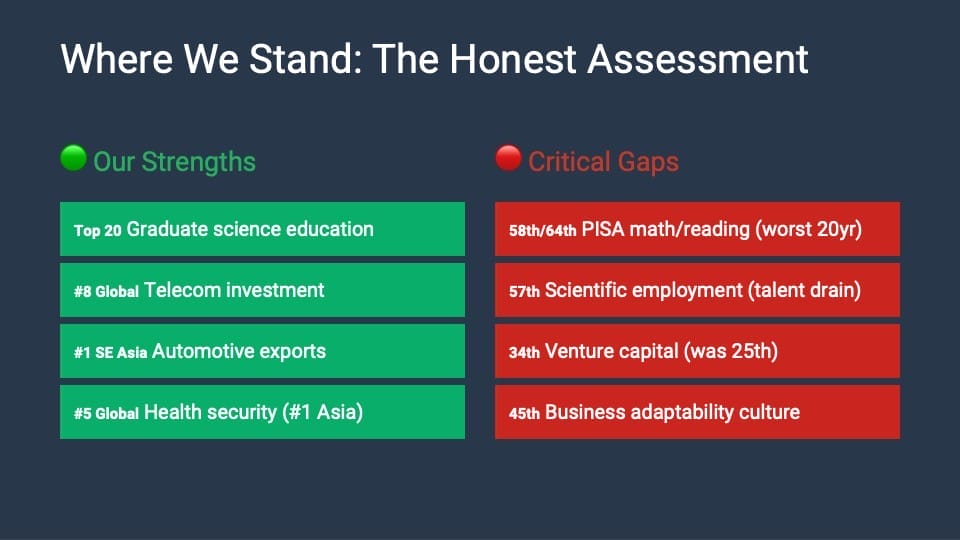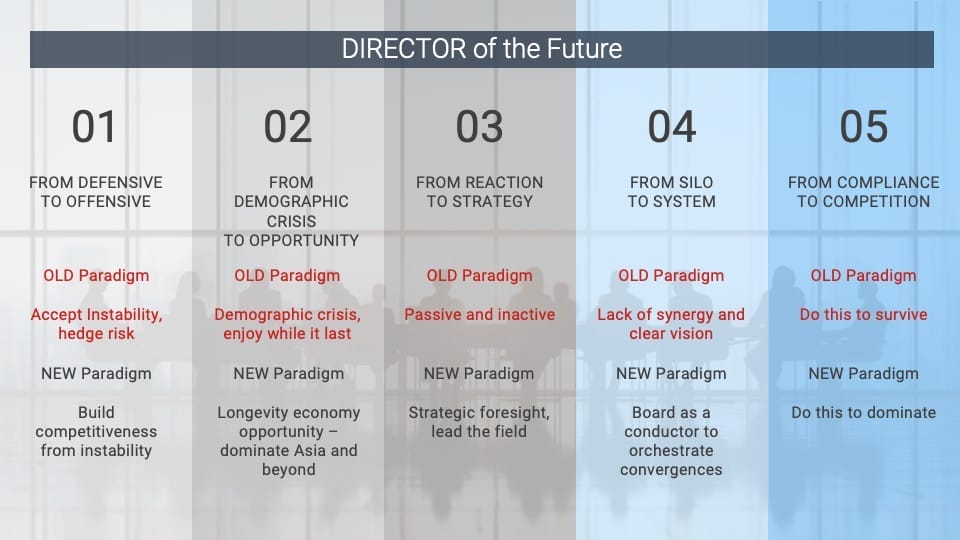Context Setting for Thailand IOD Business Transformation Summit 2025
Presentation by Dr. Nattavut Kulnides, CEO, ADGES
Executive Summary
In his opening address to the Thailand IOD Business Transformation Summit 2025, Dr. Nattavut Kulnides delivered a stark assessment of Thailand’s competitive position amid converging global forces. Drawing on IMD World Competitiveness Rankings and other authoritative data, he challenged board members to confront an uncomfortable question: Has Thailand become a nation with an “ambition deficit”? His message was clear—the time for incremental adjustments has passed. Directors must shift from defensive posturing to strategic offense, transforming demographic crises into opportunities and moving from compliance mindsets to competitive advantage.
The Great Convergence: Eight Forces Reshaping Business
Dr. Nattavut identified eight converging forces creating unprecedented complexity for business leaders:
Foundational Forces
Political Instability: Thailand has experienced three prime ministers in two years since the last election, with an average government tenure of 12-18 months. This stands in sharp contrast to regional competitors like Vietnam, where five-year government stability enables consistent long-term policy execution. The fundamental question for boards: How do we build competitiveness from instability?
Aging Demographic: Thailand is following Japan and Singapore into an aged society status, but with a critical difference, the nation is aging before becoming wealthy. Unlike its predecessors who entered demographic transition from positions of economic strength, Thailand faces the twin challenge of supporting an aging population while still developing its economic base.
Emerging Forces
Technology Infusion: The rapid integration of AI and advanced technologies is fundamentally reshaping competitive dynamics across all sectors.
Geopolitical Agility: The reconfiguration of global trade patterns and alliance structures requires nimble strategic positioning.
Green Economy: The global push toward sustainability is no longer optional, with major trading partners embedding environmental standards into trade requirements.
Climate Volatility: Organizations can no longer question whether climate change is real – they experience its impacts daily through disrupted supply chains, extreme weather events, and shifting agricultural patterns.
Work Reimagined: The intersection of AI, human intelligence, and evolving workforce expectations demands fundamental rethinking of how work gets done.Country Competitiveness: In an increasingly competitive regional landscape, national competitiveness directly impacts organizational success.

Where Thailand Stands: The Honest Assessment
The Numbers Tell the StoryAccording to the 2025 IMD World Competitiveness Ranking, Thailand has dropped five positions to 30th out of 64 economies evaluated. More concerning is the trajectory in Digital Competitiveness, where Thailand fell one position to 38th a critical indicator of future readiness in an AI-driven world.

Recognizing Our Strengths
Thailand maintains genuine competitive advantages in specific areas:
- Top 20 globally in graduate science education (STEM system)
- #8 in the world for telecom infrastructure investment
- #1 in Southeast Asia for automotive exports
- #5 globally for health security (#1 in Asia)
These strengths represent genuine foundations upon which competitive advantage can be built.
Confronting Critical Gaps
However, several alarming indicators demand immediate attention:
Educational Quality Crisis: Thailand ranks 58th in PISA mathematics scores and 64th in reading, the worst performance in 20 years. This represents a fundamental failure to develop the human capital needed for a knowledge-based economy.
Talent Drain: Despite graduating students in STEM fields at globally competitive rates (Top 20), Thailand ranks 57th in scientific employment. The nation is producing talent that either leaves for opportunities abroad or shifts to unrelated industries, a massive waste of human capital investment.
Innovation Ecosystem Decline: Thailand’s venture capital ranking has fallen from 25th to 34th, signaling declining attractiveness for high-growth entrepreneurial ventures.Adaptive Capacity: Ranking 45th in business adaptability culture reveals organizational rigidity precisely when flexibility and innovation are most critical.

The Human Capability Ceiling: A Sobering Reality
Dr. Nattavut illustrated the limits of incremental improvement through an unexpected example: the 100-meter sprint world record. Despite advances in nutrition, training methodology, and technology, Usain Bolt’s 2009 record of 9.58 seconds remains unbroken after nearly 20 years. This demonstrates that human physical capability has natural limits and that perfecting existing approaches yields diminishing returns.
He then contrasted this with AI capability growth, showing exponential improvement across multiple benchmarks, including image recognition, language understanding, and complex reasoning. The chart from Stanford’s Human-Centered AI Institute 2025 report shows AI performance crossing human-level capability in task after task, with the gap widening rapidly.
The implication for Thailand is profound: Perfecting 20th-century industrial capabilities even to world-class levels will not secure 21st-century competitiveness. The nation cannot incrementally improve its way to leadership in an AI-transformed world.
The Ambition Deficit Question
Dr. Nattavut posed a provocative question to the board members assembled: “Are we becoming a nation with an ambition deficit?”
He suggested Thailand may be settling for “good enough” accepting current circumstances rather than pursuing transformative change. The evidence: stagnant rankings, declining innovation indicators, and a tendency toward defensive rather than offensive strategies.
However, he argued forcefully against resignation. Citing the Chinese proverb that “the best time to plant a tree was 20 years ago, but the second-best time is now,” he called for immediate action despite lost opportunities.
The Director of the Future: Five Critical Paradigm Shifts
Dr. Nattavut outlined five essential transformations in board mindset and practice:
1. From Defensive to Offensive
Old Paradigm: Accept instability, hedge risks, wait for favorable conditions
New Paradigm: Build competitive advantage from instability itself, use uncertainty as a strategic opportunity
Thailand’s political turbulence need not be a fatal weakness. Organizations that develop the capability to execute strategy despite political uncertainty gain a competitive advantage over those requiring stable conditions.
2. From Demographic Crisis to Opportunity
Old Paradigm: View aging society as inevitable decline, “enjoy while it lasts”
New Paradigm: Pioneer the longevity economy develop offerings that dominate Asia and beyond
Thailand’s early entry into an aged society status positions it to develop expertise, products, and services for the region’s largest emerging market. As other Asian nations age, Thailand could be the established leader in longevity-related industries.
3. From Reaction to Strategy
Old Paradigm: Passive and inactive, respond to events as they occur
New Paradigm: Strategic foresight, actively shape the field rather than follow
This requires boards to move beyond quarterly horizons and develop genuine strategic foresight capabilities identifying opportunities before they become obvious to competitors.
4. From Silo to System
Old Paradigm: Fragmented thinking, departmental boundaries, lack of synergy
New Paradigm: Board as conductor, orchestrating convergences across boundaries
Dr. Nattavut referenced Thailand’s recent flooding crisis as evidence of silo mentality’s real costs. Effective response to converging forces requires systems thinking and cross-boundary coordination capabilities boards must model and demand.
5. From Compliance to Competition
Old Paradigm: “Do this to survive” minimum standards as ceiling
New Paradigm: “Do this to dominate” competitive excellence as baselineToo many Thai organizations treat governance, sustainability, and innovation as compliance exercises. Leading boards reframe these as competitive advantages, asking not “How do we meet the requirement?” but “How do we leverage this to dominate our market?”

Strategic Implications for Boards
Dr. Nattavut’s presentation carries several critical implications for board practice:
First, boards must expand their aperture beyond traditional business metrics to encompass the full complexity of converging forces. Political stability, demographic trends, technological disruption, and climate volatility are not “external factors” to be monitored they are core strategic variables.
Second, the accelerating pace of AI capability improvement means waiting for clarity before acting is a losing strategy. By the time the implications of AI become fully clear, competitive positions will be entrenched. Boards must embrace strategic experimentation and rapid learning.
Third, Thailand’s specific combination of strengths and weaknesses creates unique strategic opportunities. Rather than competing head-to-head in areas where others have insurmountable advantages, Thai organizations should identify positions where their particular capabilities create differentiation.
Fourth, the talent drain challenge demands board-level attention. Organizations cannot assume the market will provide needed capabilities, they must become active participants in talent development and retention.
Fifth, incremental improvement of existing business models will not suffice. The convergence of forces Dr. Nattavut described requires fundamental rethinking of value creation, competitive positioning, and organizational capability.
Key Takeaway
Dr. Nattavut concluded his context-setting remarks with both urgency and hope. The data on Thailand’s declining competitiveness is sobering, but not deterministic. The nation possesses genuine strengths and occupies a strategic position in a dynamic region.
What is needed is not incremental adjustment but bold reimagining. Directors bear particular responsibility because they occupy the critical position between long-term vision and operational execution. They can demand the strategic shifts their organizations need, even when short-term pressures argue for continuity.
The question is not whether Thailand can compete in the AI age and amid converging disruptions, it is whether Thai directors will summon the ambition and courage to lead that transformation.
As subsequent sessions in the Summit would explore, the tools and frameworks for transformation are available. What remains to be determined is whether Thailand’s business leadership will deploy them with the necessary urgency and commitment.
The second-best time to plant the tree is now. The question for every director: What will you plant today?
About the Presenter
Dr. Nattavut Kulnides is the Founder and CEO of ADGES, Thailand’s premier executive coaching and leadership development consultancy. He serves as Chairman of the Thai Institute of Directors’ Community of Practice on Business Transformation & Leadership.
This article is based on the context-setting presentation delivered at the Thailand IOD Business Transformation Summit 2025, held on November 26, 2025, under the theme “Symphony of Disruptions: The Great Convergence.”

